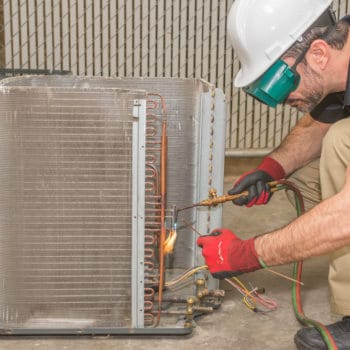Why We Love It
-
$43,210Potential Avg. Salary
-
-0.4%Job Growth Rate
-
Dependable Daily WorkloadCareer Attribute
-
Don't Take Work HomeCareer Attribute
Carpet installers specialize in installing carpet over existing floors. They remove old carpet, install new carpet using staples, nails, power stretchers, and adhesives, and remove and replace baseboards.
Recommended Schools
What is a Carpet Installer?
The following job responsibilities are common for individuals in carpet installer roles:
- Remove old carpet and prepare floors for the installation of new carpet
- Cut carpets to the appropriate lengths for flooring surfaces that need to be covered
- Install new carpet using staples, nails, power stretchers, and adhesives
- Remove baseboards during installation and install or replace baseboards after installation is complete
- Clean job sites after installations, and inspect the quality of the installation
A Day in the Life
Carpet installers are called in to install new carpet flooring in existing or new homes, buildings, and other structures. If the structure is preexisting, it likely has existing flooring that needs to be prepared before new carpet can be laid. In this situation, carpet installers may need to remove old carpet and padding or prep wood or tile floors to be covered by carpet. This may also include removing any baseboards or other molding for proper installation.
Once floors are prepped for new carpet, carpet installers go about measuring rooms and cutting carpets and padding to fit within the areas of installation. Cut carpet is delivered to the area of installation and installed using a variety of methods. Carpet installers may need to staple carpet in place, nail it in place, or adhere it to floors using a strong adhesive. Additionally, carpet installers use specialized stretching tools to stretch carpets to ensure tight fits and to avoid lumping after installation.
After carpet is installed, carpet installers inspect the quality of their work. Any issues are rectified before finishing touches are applied, such as reinstalling baseboard and other woodwork. Once the job is complete, carpet installers clean the work area to finalize the job and present their work to homeowners or other project stakeholders for approval and to receive payment.
Typical Work Schedule
Most carpet installer roles are full-time positions. Some carpet installers may work normal business hours, while others may work evenings and weekends—especially if the installation is in an office where people are conducting business during first shift. Overtime is occasionally required to meet deadlines.
Typical Employers
Almost half of carpet installers are self-employed and perform carpet installations for individual clients. Others work for construction companies, real estate development companies, or carpet sales and distribution companies that offer carpet installation as part of their services.
Recommended Schools
How To Become a Carpet Installer
No formal higher education is required to become a carpet installer, and most carpet installers learn how to perform job tasks through on-the-job training under an experienced carpet installer. A high school diploma is sufficient for finding work as a carpet installer, and most new carpet installers begin their careers as assistants or helpers. They may initially perform tasks like carrying materials and tools for carpet installers and observing work before beginning to install carpets on their own.
After earning professional experience as a carpet installer, you may decide to pursue certification from the International Certified Floorcovering Installers Association (CFI). Certification requires two years of professional experience and passing both a written and practical examination. While this certification is not a requirement for finding work as a carpet installer, it can increase your competitiveness when applying for higher-paying or more senior-level roles.
Carpet installers who aspire to be self-employed one day can also benefit from taking college coursework in business, technology, and marketing. These courses can teach aspiring self-employed carpet installers important skills needed in running a business, as well and marketing skills required for finding and reaching potential new clients.
Carpet Installer Salary Data
We’ve provided you the following to learn more about this career. The salary and growth data on this page comes from recently published Bureau of Labor Statistics data while the recommendations and editorial content are based on our research.
National Anual Salary
Low Range
$26,850Average
$43,210High Range
$77,700National Hourly Wage
Low Range
$13/hrAverage
$21/hrHigh Range
$37/hrHow do Carpet Installer salaries stack up to other jobs across the country? Based on the latest jobs data nationwide, Carpet Installer's can make an average annual salary of $43,210, or $21 per hour. This makes it an Above Average Salary. On the lower end, they can make $26,850 or $13 per hour, perhaps when just starting out or based on the state you live in.
Salary Rankings And Facts
#474 Nationally for All Careers
Highest Education Among Carpet Installers
- 0.1% Doctorate
- 0.4% Masters
- 2.8% Bachelors
- 3.6% Associates
- 15.2% College
- 41.7% High School
- 36.4% Less than High School
Job Growth Projections and Forecast
2014 Total Jobs
45,3002024 Est. Jobs
45,100Job Growth Rate
-0.4%Est. New Jobs
-200How does Carpet Installer job growth stack up to other jobs across the country? By 2024, there will be a change of -200 jobs for a total of 45,100 people employed in the career nationwide. This is a -0.4% change in growth over the next ten years, giving the career a growth rate nationwide of Below Average.
Growth Rankings And Facts
#623 Nationally for All Careers
What Companies Employ The Most Carpet Installers
| Industry | Current Jobs | New Jobs Needed | % Increase |
|---|---|---|---|
| Self-employed workers | 19,100 | 900 | 1% |
| Home furnishings stores | 7,300 | -500 | -1% |
| Drywall and insulation contractors | 300 | --- | --- |













